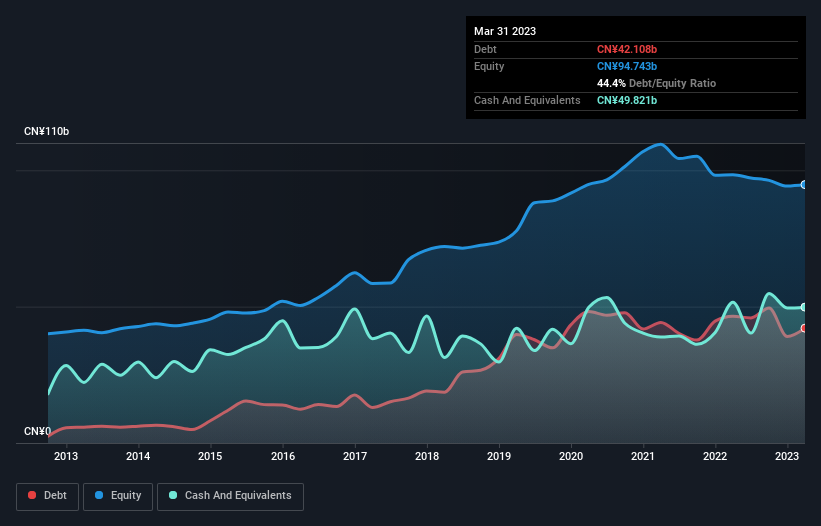
Warren Buffett famously said, 'Volatility is far from synonymous with risk.' It's only natural to consider a company's balance sheet when you examine how risky it is, since debt is often involved when a business collapses. We note that Shanghai Electric Group Co., Ltd. (HKG:2727) does have debt on its balance sheet. But the real question is whether this debt is making the company risky.
Why Does Debt Bring Risk?
Debt and other liabilities become risky for a business when it cannot easily fulfill those obligations, either with free cash flow or by raising capital at an attractive price. Part and parcel of capitalism is the process of 'creative destruction' where failed businesses are mercilessly liquidated by their bankers. While that is not too common, we often do see indebted companies permanently diluting shareholders because lenders force them to raise capital at a distressed price. Of course, the upside of debt is that it often represents cheap capital, especially when it replaces dilution in a company with the ability to reinvest at high rates of return. When we examine debt levels, we first consider both cash and debt levels, together.
See our latest analysis for Shanghai Electric Group
What Is Shanghai Electric Group's Debt?
As you can see below, Shanghai Electric Group had CN¥42.1b of debt at March 2023, down from CN¥46.4b a year prior. But it also has CN¥49.8b in cash to offset that, meaning it has CN¥7.71b net cash.

How Strong Is Shanghai Electric Group's Balance Sheet?
The latest balance sheet data shows that Shanghai Electric Group had liabilities of CN¥160.8b due within a year, and liabilities of CN¥31.6b falling due after that. On the other hand, it had cash of CN¥49.8b and CN¥75.6b worth of receivables due within a year. So its liabilities outweigh the sum of its cash and (near-term) receivables by CN¥67.0b.
Given this deficit is actually higher than the company's market capitalization of CN¥63.1b, we think shareholders really should watch Shanghai Electric Group's debt levels, like a parent watching their child ride a bike for the first time. In the scenario where the company had to clean up its balance sheet quickly, it seems likely shareholders would suffer extensive dilution. Given that Shanghai Electric Group has more cash than debt, we're pretty confident it can handle its debt, despite the fact that it has a lot of liabilities in total. When analysing debt levels, the balance sheet is the obvious place to start. But it is future earnings, more than anything, that will determine Shanghai Electric Group's ability to maintain a healthy balance sheet going forward. So if you're focused on the future you can check out this free report showing analyst profit forecasts.
Over 12 months, Shanghai Electric Group made a loss at the EBIT level, and saw its revenue drop to CN¥114b, which is a fall of 12%. That's not what we would hope to see.
So How Risky Is Shanghai Electric Group?
Although Shanghai Electric Group had an earnings before interest and tax (EBIT) loss over the last twelve months, it generated positive free cash flow of CN¥4.2b. So taking that on face value, and considering the net cash situation, we don't think that the stock is too risky in the near term. Given the lack of transparency around future revenue (and cashflow), we're nervous about this one, until it makes its first big sales. To us, it is a high risk play. For riskier companies like Shanghai Electric Group I always like to keep an eye on the long term profit and revenue trends. Fortunately, you can click to see our interactive graph of its profit, revenue, and operating cashflow.
If you're interested in investing in businesses that can grow profits without the burden of debt, then check out this free list of growing businesses that have net cash on the balance sheet.
New: Manage All Your Stock Portfolios in One Place
We've created the ultimate portfolio companion for stock investors, and it's free.
• Connect an unlimited number of Portfolios and see your total in one currency
• Be alerted to new Warning Signs or Risks via email or mobile
• Track the Fair Value of your stocks
Have feedback on this article? Concerned about the content? Get in touch with us directly. Alternatively, email editorial-team (at) simplywallst.com.
This article by Simply Wall St is general in nature. We provide commentary based on historical data and analyst forecasts only using an unbiased methodology and our articles are not intended to be financial advice. It does not constitute a recommendation to buy or sell any stock, and does not take account of your objectives, or your financial situation. We aim to bring you long-term focused analysis driven by fundamental data. Note that our analysis may not factor in the latest price-sensitive company announcements or qualitative material. Simply Wall St has no position in any stocks mentioned.
About SEHK:2727
Shanghai Electric Group
Provides industrial-grade eco-friendly smart system solutions in Mainland China and internationally.
Undervalued with excellent balance sheet.

